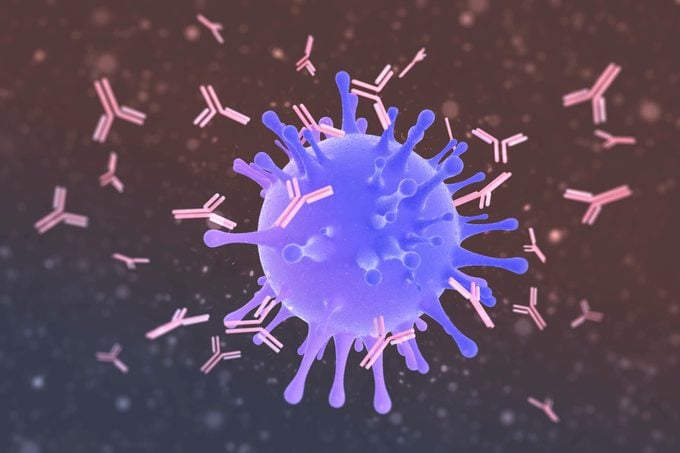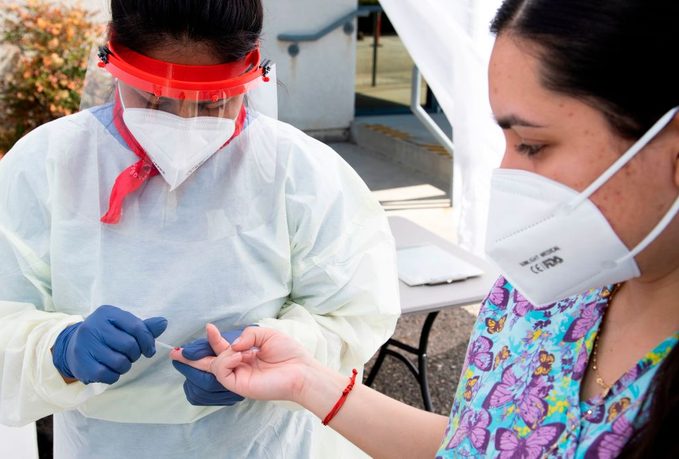What You Should Know About Coronavirus Antibody Testing
Updated: Oct. 12, 2020
Testing for antibodies to Covid-19 do hold promise but they're still a long way from delivering on those promises, experts say. Here's how antibody tests work and where we stand now with Covid-19 antibody tests.
With much of the country taking steps to open up now or in the near future, hopes are high that testing more people for Covid-19 antibodies might help. In an ideal world, people who test positive for Covid-19 antibodies—indicating they had been infected with the coronavirus in the past—would be immune from getting Covid-19 again in the future. However, there’s no clear evidence yet that this is the case.
Right now, says S. Wesley Long, MD, PhD, assistant professor of pathology and genomic medicine at Houston Methodist Hospital, there’s a “disconnect between that hope and reality.” Antibody tests are available for Covid-19 but much is still unknown about the virus, the antibodies the body generates in response to it, and the reliability of existing tests. This is where the U.S. stands with Covid-19 antibody testing and what it means going forward.

What are antibodies?
Antibodies are small Y-shaped proteins that float around in the blood and other parts of the body, like mucus, saliva, and the body’s tissues. They are produced when your immune system recognizes something as foreign, and potentially dangerous—like bacteria, viruses, fungi, cancer cells, or even pet dander.
“We have hundreds of millions of these in actual numbers and also types of antibodies,” says says Matthew G. Heinz, MD, a hospitalist and internist at Tucson Medical Center in Arizona. The prongs at the top of these different “Y” shaped molecules bind specifically to the foreign element, such as Covid-19. Once an antibody recognizes and binds to something, it’s essentially tagged for destruction by the immune system.
“Antibodies show up, bind to the [foreign object] and just overwhelm it,” explains Dr. Heinz.
We do know that patients with Covid-19 produce antibodies in response to the virus. In one study of 285 Covid-19 patients in a hospital in China, 100% of the patients had developed antibodies to the virus. That study was published in April in the journal Nature Medicine.
(This is what you should look for if you think you’ve had Covid-19.)
What are the different types of antibodies?
Although there are five main types of antibodies, two in particular are relevant for Covid-19: immunoglobulin M (IgM) and immunoglobulin G (IgG). There are currently tests for both of these as well as for total antibody and for immunoglobulin A (IgA), which is present in saliva and mucus, according to the Centers for Disease Control and Prevention (CDC).
Different antibodies are present in different parts of the body and arise at different times during the course of the infection Typically, IgM antibodies are the first to show up, and are most often found in the blood. “It’s a big-tank antibody,” says Dr. Heinz, who also headed the Obama administration’s domestic response to the Ebola crisis. They are big (like, five to six times the size of IgG), relatively non-specific, and tend to disappear in 2 to 3 weeks.
They’re followed by IgG antibodies, which are smaller and more specific for the target, and take about 1 to 3 weeks to show up after an infection. These smaller antibodies can travel in the blood and diffuse into the body’s tissues. In the case of Covid-19, these two antibody types can appear in sequence or at nearly the same time, which, according to the study of Covid-19 patients in China, was within 19 days after the start of symptoms. IgG antibodies have a longer memory and they harbor a grudge. If the invader returns, they’ll send out the troops. (Learn if lockdown is hurting your immune system.)
Why are antibody tests useful?
Generally, antibody tests (also called serology testing) can reveal a wealth of information about a disease. For starters, they can tell how widespread the disease is in the population (if you test a lot of people). That makes them useful for public-health agencies tracking the course of an infection, says Dr. Long.
They can also help us understand how a virus (or other infection) works, and they’re critical for for developing vaccines. By exposing you to non-harmful version of a pathogen, vaccines prompt your body to produce antibodies ahead of time, explains Dr. Heinz. That way, IgG is already present and ready to fight off bacteria, a virus, or other germs the first time you encounter them—ideally before you can even get sick. (Here are the symptoms of Covid-19.)
How do antibody tests work?
Antibody tests (also called serological tests) look for portions of these potentially protective molecules in your blood. Some give results within minutes, and others are sent to a lab to be assessed and take a little longer to come back. Still others allow you to take the blood sample at home before sending it to a lab for evaluation. (Although there are no at-home blood collection kits for Covid-19 antibody testing as of yet.)
Antibody tests are not the same as the tests used to diagnose diseases. So they’re not useful for detecting active infections. That’s because antibodies don’t develop until weeks or months after the infection takes hold. For example, Covid-19 is diagnosed using tests that look for the genetic material of the virus—not antibodies—in samples collected from a nasopharyngeal swab (back of nose and throat) or saliva. (Learn more about the diagnostic tests for Covid-19.)
I’ve heard antibody tests aren’t reliable. Is that true?
Usually, laboratory tests undergo an elaborate FDA vetting process before being approved. But Covid-19 spread so quickly and caused so much serious illness that the agency relaxed some of its restrictions with the result that many, many tests flooded the market. At one point, says Dr. Heinz, there were more than 100 Covid-19 antibody tests on the market.
Not all of them produced accurate results, so the FDA tightened up the approval process (though it’s still fast-tracked) and even removed some of those tests from the market.
“The FDA is now requiring a much more stringent process to demonstrate quality control,” confirms Dr. Heinz. “We now have strict rules.” That means the available tests are of fairly high quality, he adds.
So now if you get an antibody test that’s been approved by the FDA, the results are pretty reliable (although no test is perfect all of the time).

What tests are available for Covid-19 antibodies and how accurate are they?
There are probably about 16 FDA-approved tests for Covid-19 antibodies on the market right now, says Dr. Long. And more are on the way.
The tests vary in how accurate they are, reports the Association of Public Health Laboratories (APHL). High-quality tests should be 99% accurate in two key categories: sensitivity and specificity, according to Nature News. (You can see what antibody tests for coronavirus have been approved by looking at the FDA’s website, as well as the sensitivity and specificity for each one).
The sensitivity tells you how often the test accurately identifies people who actually had a germ. A test with high sensitivity will pick up on people who were infected with coronavirus in the past, and will avoid “false negatives,” meaning people who test negative when they have actually had the virus. Specificity is how often the test accurately identifies people who didn’t have coronavirus. A test that has a high specificity will avoid “false positives,” meaning it won’t suggest that you had coronavirus when you in fact did not.
Some tests early on had low sensitivities and specificities, sometimes around 40%. Most of those now approved by the FDA are much higher, even as high as 100%. (Here’s what experts think about whether you can get infected a second time by Covid-19.)
What does it mean if you have Covid-19 antibodies?
Experts do not yet know if Covid-19 antibodies make you immune to the disease. The presence of these antibodies certainly suggests that people who have developed them will not get a second infection, but no one is willing to say for sure, says Dr. Heinz.
Nor do we know how long that immunity lasts, if it exists at all. “It does not appear that in general that reinfection is a common phenomenon with all the available data, but then the question becomes what’s the duration of that immunity,” says Dr. Long. “We still don’t really know. The virus has only been around only since first of the year.”
In an April report in the Journal of Arthroplasty, Arizona researchers noted that antibodies to SARS-CoV, a related coronavirus that caused the 2003 SARS outbreak, seemed to last for an average of two years and then began to wane.
And two other types of coronaviruses that cause only cold-like symptoms seem to trigger protective immunity for about 45 weeks, according to a May study in the journal Science. However, people who are infected a second time with one of these cold viruses may have some protection. According to a small 1990 study published in the journal Epidemiology & Infection, some people who did get reinfected with a cold-causing coronavirus were less likely to have symptoms the second time around, and were contagious for a shorter period of time,
Of course these viruses are related to the SARS-CoV-2, the one that causes Covid-19, but are not exactly the same, so it’s hard to say for sure how long protection may last in those who have antibodies to the virus.
But the antibody tests can still be useful
While Covid-19 antibody testing probably shouldn’t be used yet to figure out if you’re immune, it does have other uses. One is to determine how many people the virus has infected, says the Infectious Diseases Society of America. This can help guide decision-making: Where do critical resources need to be deployed? How safe is it to reopen?
Antibody tests may also be helpful in some cases to pin down a diagnosis in people with suspected Covid-19 but who tested negative on a viral test. Antibody tests are also critical in the quest to develop a vaccine for Covid-19. Having antibodies to Covid-19 could help determine if you’re eligible to donate convalescent plasma for patients who are still sick.
Finally, a positive test can point officials in the right direction when conducting contact tracing, says Dr. Heinz.